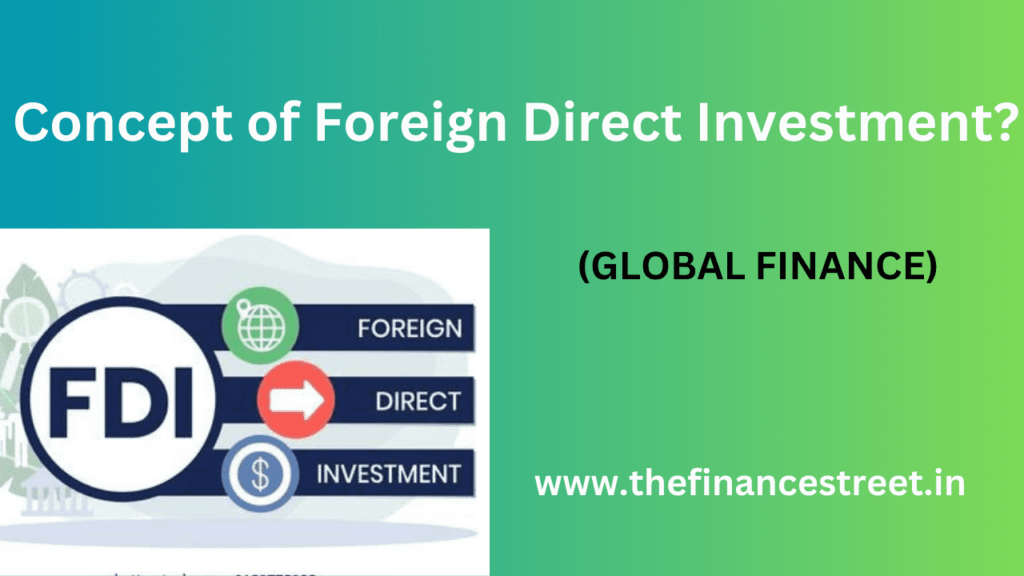Introduction for concept of foreign direct investment?
Foreign direct investment (FDI) is the investment made by a foreign company or individual in a host country to establish a lasting interest in the management of a business enterprise. FDI has become an increasingly important source of capital, technology, and know-how for many developing countries, and has played a significant role in promoting economic growth and development.
FDI involves a wide range of activities, including establishing subsidiaries or joint ventures, acquiring ownership or controlling interests in existing companies, and establishing greenfield projects. FDI can have a range of positive impacts on the host country, including the creation of jobs, the transfer of technology and know-how, and the promotion of trade and economic activity.
However, FDI is a complex issue that has both benefits and drawbacks, and requires careful consideration of its economic, social, and environmental impacts. While FDI can promote economic growth and development, it can also create economic dependency, political interference, and environmental and social costs.
Therefore, it is important for governments to have effective policies and regulations in place to ensure that FDI serves the best interests of the host country and its people. This includes measures to protect the environment, promote social welfare, and ensure a fair distribution of benefits and risks.
What is the concept of foreign direct investment?
Foreign Direct Investment (FDI) refers to a business investment made by a company or an individual in a foreign country. It involves the acquisition of assets or a controlling interest in a company located in another country, with the objective of establishing a lasting interest in the management of the business.
FDI can take different forms, such as acquiring shares in an existing company, establishing a joint venture with a local partner, or setting up a wholly-owned subsidiary in the foreign country. The investment can be made in various sectors, including manufacturing, services, mining, and agriculture.
FDI is an important source of capital for many developing countries, as it can bring in new technology, create jobs, and promote economic growth. It can also provide access to new markets and resources for the investing company. However, FDI can also have some negative impacts, such as the risk of exploitation by multinational corporations, environmental degradation, and social disruption.
Governments can promote or restrict FDI through policies such as tax incentives, investment protection agreements, or restrictions on foreign ownership in certain sectors. FDI is a significant component of international business and plays a crucial role in the global economy.
What is the importance of FDI in Indian economy?
Foreign Direct Investment (FDI) has played a significant role in the economic development of India since the country opened up to foreign investment in the 1990s. Here are some of the key ways FDI has been important for the Indian economy:
- Capital inflows: FDI has been an important source of capital inflows into India, helping to finance investments in various sectors, such as manufacturing, services, infrastructure, and technology. FDI inflows have also helped to bridge the country’s current account deficit.
- Technology transfer: FDI has brought in advanced technology, processes, and management practices, which have helped to improve the efficiency and productivity of domestic firms. This has helped to promote innovation, enhance competitiveness, and boost exports.
- Employment generation: FDI has helped to create jobs in India, especially in labor-intensive industries such as textiles, automobiles, and electronics. This has helped to reduce poverty, increase household incomes, and improve living standards.
- Export promotion: FDI has facilitated India’s integration into the global economy by promoting exports. Foreign companies have set up export-oriented units in India, which have helped to increase India’s share in global trade and reduce the trade deficit.
- Regional development: FDI has helped to promote regional development by attracting investment to backward regions and creating employment opportunities there. This has helped to reduce regional disparities and promote balanced regional development.
Overall, FDI has been a crucial driver of economic growth and development in India. The government has been actively promoting FDI through various policy initiatives, such as liberalization of investment norms, simplification of procedures, and the establishment of special economic zones.
What is the history of foreign direct investment?
Foreign direct investment (FDI) has a long and varied history, dating back centuries to the early days of global trade and commerce. Here are some of the key milestones in the history of FDI:
- Colonialism: European powers established colonies around the world in the 16th to 19th centuries, creating networks of trade and investment that brought wealth and resources back to Europe.
- Industrialization: In the 19th century, industrialization led to the growth of large corporations that sought new markets and sources of raw materials abroad. These corporations invested in foreign factories, mines, and other assets to expand their operations globally.
- Post-World War II: After World War II, the Bretton Woods Conference established the International Monetary Fund and the World Bank, which helped to promote international trade and investment. In the 1960s and 1970s, many countries in Africa, Asia, and Latin America gained independence and began to attract foreign investment.
- 1990s to present: In the 1990s, globalization and liberalization of trade and investment policies led to a surge in FDI flows. Many countries in Asia, such as China and India, opened up to foreign investment, and multinational corporations expanded their global operations. In recent years, there has been increasing concern about the impact of FDI on issues such as labor rights, environmental protection, and income inequality.
Today, FDI continues to play a significant role in the global economy, with many countries actively seeking to attract foreign investment through policies such as tax incentives, investment protection agreements, and streamlined regulatory frameworks.
What are the key features of FDI?
Here are some key features of Foreign Direct Investment (FDI):
- Investment in a foreign country: FDI involves investment by a company or an individual in a foreign country. The investment can take various forms, such as acquiring shares in an existing company, establishing a joint venture with a local partner, or setting up a wholly-owned subsidiary.
- Long-term commitment: FDI involves a long-term commitment by the investing company or individual to the foreign country. The objective is to establish a lasting interest in the management of the business and to participate in the economic development of the host country.
- Control over operations: FDI involves acquiring a significant level of control over the operations of the foreign entity. This can take the form of acquiring a controlling stake in the company or having significant influence over management decisions.
- Transfer of resources: FDI involves the transfer of resources, such as capital, technology, and know-how, from the investing company to the foreign entity. This can help to improve the efficiency and productivity of the foreign entity and promote economic development in the host country.
- Risk sharing: FDI involves sharing the risks and rewards of the foreign venture between the investing company and the foreign entity. This can help to mitigate the risks associated with operating in a foreign country and improve the chances of success.
- Integration with global operations: FDI involves integrating the foreign entity into the global operations of the investing company. This can help to promote economies of scale, enhance competitiveness, and access new markets and resources.
Overall, FDI is a complex and multi-faceted phenomenon that involves various economic, political, and social factors. The features of FDI can vary depending on the specific context and the objectives of the investing company.
What is the difference between FDI and FII ?
Foreign Direct Investment (FDI) and Foreign Institutional Investment (FII) are two types of investment that involve foreign entities investing in a country. Here are the key differences between FDI and FII:
- Nature of investment: FDI involves a long-term investment in a foreign entity, with the objective of establishing a lasting interest in the management of the business and participating in the economic development of the host country. In contrast, FII involves short-term investment in securities such as stocks, bonds, and mutual funds, with the objective of earning a return on investment.
- Level of control: FDI involves acquiring a significant level of control over the operations of the foreign entity, such as acquiring a controlling stake or having significant influence over management decisions. FII does not involve acquiring control over the company, but rather owning a portion of the company’s securities.
- Sector focus: FDI tends to focus on investment in the real sector, such as manufacturing, services, infrastructure, and technology. In contrast, FII tends to focus on investment in the financial sector, such as stocks and bonds.
- Impact on the economy: FDI is considered to have a more significant impact on the economy, as it involves investment in the real sector, which can lead to job creation, technology transfer, and overall economic development. FII has a more limited impact on the economy, as it involves investment in securities, which can be more volatile and less stable.
Overall, FDI and FII are two different types of investment that serve different objectives and have different impacts on the economy. While FDI is more focused on long-term investment in the real sector, FII is more focused on short-term investment in securities.
Critical analysis of foreign direct investment?
Foreign Direct Investment (FDI) is a complex and controversial topic that has both benefits and drawbacks. Here are some critical analysis points to consider:
Benefits of FDI:
- Promotes economic growth: FDI can promote economic growth by creating jobs, improving productivity, and contributing to technological progress. This can lead to increased economic activity, higher living standards, and reduced poverty.
- Access to capital and technology: FDI can provide access to capital, technology, and know-how, which can help to improve the efficiency and competitiveness of local companies. This can lead to the development of new industries and the expansion of existing ones.
- Facilitates trade: FDI can facilitate international trade by establishing linkages between foreign and local companies. This can help to create new markets and promote the exchange of goods and services between countries.
Drawbacks of FDI:
- Economic dependency: FDI can create economic dependency on foreign companies and investors, which can lead to a loss of control over key sectors of the economy. This can lead to an unequal distribution of benefits and risks, and limit the ability of local companies to compete on a global scale.
- Political interference: FDI can lead to political interference from foreign governments or companies, which can undermine the sovereignty of the host country. This can lead to tensions between the host country and foreign investors, and limit the ability of the host country to make independent policy decisions.
- Environmental and social costs: FDI can have environmental and social costs, such as pollution, deforestation, displacement of local communities, and labor exploitation. These costs can have long-term negative impacts on the economy and society, and can be difficult to mitigate or reverse.
Overall, FDI is a complex and controversial issue that requires careful consideration of its benefits and drawbacks. While FDI can promote economic growth and development, it can also create economic dependency, political interference, and environmental and social costs. Therefore, it is important to have effective policies and regulations in place to ensure that FDI serves the best interests of the host country and its people.
Conclusion for concept of foreign direct investment?
In conclusion, foreign direct investment (FDI) refers to the investment made by a foreign company or individual in a host country to establish a lasting interest in the management of a business enterprise. FDI has become an important source of capital, technology, and know-how for many developing countries, and has played a significant role in promoting economic growth and development.
However, FDI is a complex issue that has both benefits and drawbacks, and requires careful consideration of its economic, social, and environmental impacts. While FDI can promote economic growth and development by creating jobs, improving productivity, and contributing to technological progress, it can also create economic dependency, political interference, and environmental and social costs.
Therefore, it is important for governments to have effective policies and regulations in place to ensure that FDI serves the best interests of the host country and its people. This includes measures to protect the environment, promote social welfare, and ensure a fair distribution of benefits and risks. With the right policies and regulations, FDI can continue to play a positive role in promoting economic growth and development in the global economy.



